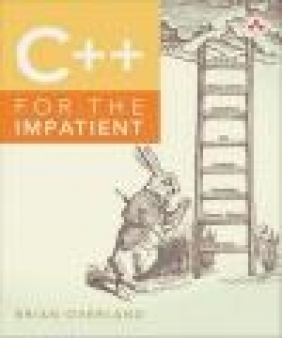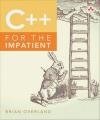C++ for the Impatient
Brian Overland
C++ for the Impatient
Brian Overland
- Producent: Addison Wesley Publishing Company
- Rok produkcji: 2013
- ISBN: 9780321888020
- Ilość stron: 816
- Oprawa: Miękka
Niedostępna
Opis: C++ for the Impatient - Brian Overland
A Ready Reference for C++ C++ for the Impatient offers both the quickest way for busy programmers to learn the latest features of the C++ language and a handy resource for quickly finding answers to specific language questions. Designed to give you the most accurate and up-to-date information you require fast and to the point, this book is also an essential guide to the new C++11 standard, including advanced uses of the C++ standard library. Features include * Concise descriptions of nearly every function, object, and operator in the C++ core language and standard library, with clear, well-chosen examples for each of them * Information provided "at a glance" through syntax displays, tables, and summaries of important functions * Content organized for quick look-up of needed information * Simple explanations of advanced concepts, using helpful illustrations * Complete program examples that are both useful and intriguing, including puzzles, games, and challenging exercises C++11 features, all covered in the book, include: * Lambdas * rvalue references * Regular-expression library * Randomization library * Hash-table containers * Smart pointers C++ for the Impatient is an ideal resource for anyone who needs to come up to speed quickly on C++11. Whether or not it's your first C++ book, it will be one you come back to often for reliable answers.Preface xix Acknowledgments xxvii About the Author xxix Chapter 1: C++ Fundamentals 1 1.1 Elements of a C++ Program 1 1.2 Dealing with "Flashing Console" 4 1.3 Working with Microsoft Visual Studio 5 1.4 Doing More with C++ 6 1.5 Adding Simple Variable Declarations 7 1.6 Introduction to C++ Control Structures 10 1.6.1 Making Decisions with "if" 11 1.6.2 Looping with "while" 13 1.7 General Structure of a C++ Program 14 1.8 More about Namespaces 15 1.9 Some Comments about Comments 17 1.9.1 C++ Comments (Line Comments) 17 1.9.2 C-Language-Style Comments 17 1.10 Sample App: Adding Machine 19 Exercises 20 1.11 Sample App: Calculating Phi 20 Exercises 23 Chapter 2: Data 25 2.1 Declaring Simple Variables 25 2.2 Primitive Data Types 27 2.3 Symbolic Names ("Symbols") 30 2.4 Numeric Literals 31 2.5 Mixing Numeric Types 33 2.5.1 Integer versus Floating Point 34 2.5.2 bool versus Integer Types 34 2.5.3 Signed versus Unsigned Integers 35 2.6 String and Character Literals 39 2.6.1 Single-Quoted Characters 39 2.6.2 Double-Quoted Strings 40 2.6.3 Special Characters (Escape Sequences) 41 2.6.4 Wide-Character Strings 45 2.6.5 Raw String Literals (C++11) 46 2.7 Data Declarations: The Complete Syntax 46 2.8 Enumerated Types 50 2.9 Special Declarations (typedef, auto, decltype) 52 2.9.1 The typedef Keyword 52 2.9.2 The auto and decltype Keywords (C++11) 53 2.10 Sample App: Type Promotion 54 Exercises 55 Chapter 3: Operators 57 3.1 Precedence, Associativity, and Lvalues 57 3.2 Concise Summary of Operators 59 3.3 Operators in Detail 62 3.4 The Great Controversy: Postfix or Prefix? 77 3.5 Bitwise Operators in Detail 78 3.6 Cast Operators 82 Exercises 90 Chapter 4: Control Structures 91 4.1 Concise Summary of C++ Statements 91 4.2 Null Statements (;) and Expression Statements 93 4.3 Compound Statements 94 4.4 if and if-else Statements 96 4.5 while and do-while Statements 98 4.6 for Statements 99 4.7 Range-based for Statements (C++11) 101 4.8 switch Statements 103 4.9 Jump Statements (break, continue, goto) 104 4.10 Exception Handling (try, catch) 106 4.11 Sample App: Guess-the-Number Game 111 Exercises 113 4.12 Sample App: Computer Guesses the Number 113 Exercises 115 Chapter 5: Functions 117 5.1 Overview of Traditional (Named) Functions 117 5.2 Local and Global Variables 122 5.3 Complete Function Declaration Syntax 124 5.4 Function Overloading 126 5.5 Arguments with Default Values 128 5.6 Variable-Length Argument Lists 129 5.7 Lambda, or Anonymous, Functions (C++11) 131 5.8 constexpr Functions (C++11) 141 5.9 Sample App: Odds at Dice 142 Exercises 145 Chapter 6: Pointers, Arrays, and References 147 6.1 References 147 6.2 Arrays 152 6.3 Pointers 159 6.4 Complex Declarations Involving Pointers 175 6.5 Passing and Returning Function Pointers 178 6.6 Smart Pointers (C++11) 180 6.7 Sample App: Sieve of Eratosthenes 186 Exercises 188 Chapter 7: Classes and Objects 189 7.1 Overview: Structures, Unions, and Classes 189 7.2 Basic Class Declaration Syntax 191 7.3 Constructors 205 7.4 Destructors 216 7.5 The Hidden "this" Pointer 217 7.6 Operator Functions (Op Overloading) 218 7.7 Deriving Classes (Subclassing) 229 7.8 Bit Fields 240 7.9 Unions 242 7.10 Sample App: Packed Boolean 245 Exercises 248 Chapter 8: Preprocessor Directives 249 8.1 General Syntax of Preprocessor Directives 249 8.2 Summary of Preprocessor Directives 250 8.3 Using Directives to Solve Specific Problems 254 8.3.1 Creating Meaningful Symbols with #define 254 8.4 Preprocessor Operators 259 8.5 Predefined Macros 260 8.6 Creating Project Header Files 263 Chapter 9: Creating and Using Templates 265 9.1 Templates: Syntax and Overview 265 9.2 Function Templates 267 9.3 Class Templates 272 9.4 Class Templates with Member Functions 276 9.4.1 Class Templates with Inline Member Functions 276 9.4.2 Class Templates with Separate Function Definitions 276 9.5 Using Integer Template Parameters 278 9.6 Template Specialization 279 9.7 Variadic Templates (C++11) 281 9.8 Sample App: Type Promotion, v 2 288 Exercises 289 Chapter 10: C-String Library Functions 291 10.1 Overview of the C-String Format 291 10.2 Input and Output with C-Strings 293 10.3 C-String Functions 294 10.4 String Tokenizing with strtok 300 10.5 Individual-Character Functions 301 10.6 Memory-Block Functions (memcpy, and so on) 304 10.7 Wide-Character Functions (wstrcpy, and so on) 306 Chapter 11: C I/O Library Functions 309 11.1 Overview of C Library I/O 309 11.2 Console I/O Functions 310 11.3 Print/Scan Formats 313 11.4 Input and Output to Strings 321 11.5 File I/O 321 Chapter 12: Math, Time, and Other Library Functions 333 12.1 Trigonometric Functions 333 12.2 Other Math Functions 336 12.3 The C Date and Time Library 339 12.4 String-to-Number Conversions 347 12.5 Memory-Allocation Functions 348 12.6 Standard C Randomization Functions 350 12.7 Searching and Sorting Functions 351 12.8 Other Standard C Library Functions 355 12.9 Sample App: Idiot Savant 358 Exercises 359 Chapter 13: C++ I/O Stream Classes 361 13.1 The Basics of C++ I/O Streams 361 13.2 Reading a Line of Input with getline 364 13.3 The C++ Stream-Class Hierarchy 366 13.4 Stream Objects: Manipulators and Flags 368 13.5 Stream Member Functions (General Purpose) 379 13.6 File Stream Operations 385 13.7 Reading and Writing String Streams 395 13.8 Overloading Shift Operators for Your Classes 398 13.9 Sample App: Text File Reader 400 Exercises 401 Chapter 14: The C++ STL String Class 403 14.1 Overview of the String Class 403 14.2 String Class Constructors 405 14.3 String Class Operators 406 14.4 Concise Summary of Member Functions 410 14.5 Member Functions in Detail 410 14.6 String Class Iterators 424 14.7 Wide-Character String Class (basic_string) 430 Chapter 15: Introduction to STL (vector, deque) 431 15.1 A Tour of the Container Templates 431 15.2 Introduction to Iterators 433 15.3 The vector Template 434 15.4 The deque Template 447 15.5 The bitset Template 458 15.5.1 bitset Constructors 459 15.6 Sample App: Alpha File Organizer 461 Exercises 463 Chapter 16: STL Sequence Containers (List) 465 16.1 Sorting Elements (Strict Weak Ordering) 465 16.2 The list Template 466 16.2.3 Concise Summary of list Functions 471 16.2.4 List Member Functions in Detail 472 16.3 The stack Template 481 16.4 The queue Template 484 16.5 The priority_queue Template 487 16.6 Sample App: Find the Median 491 Exercises 493 Chapter 17: STL Associated Containers (map, set) 495 17.1 The pair Template 495 17.2 The map Template 497 17.3 The set Template 518 17.4 The multimap Template 529 17.5 The multiset Template 532 17.6 Unordered Containers (C++11) 534 17.7 Sample App: Guess-the-Word Game 543 Exercises 545 Chapter 18: STL Algorithms 547 18.1 STL Algorithms: General Concepts 547 18.2 Using Lambda Functions (C++11) 550 18.3 Algorithms and Iterators 551 18.4 Insert Iterators 553 18.5 Sample App: Finding the Median 555 18.6 Concise Summaries of Algorithms 556 18.7 Detailed Descriptions of Algorithms 564 Chapter 19: C++11 Randomization Library 599 19.1 Issues in Randomization 599 19.2 A Better Randomization Scheme 601 19.3 Common Engines 604 19.4 Common Distributions 605 19.5 Operations on Engines 608 19.6 Operations on Distributions 609 19.7 Sample App: Dice Game 610 Exercises 612 Chapter 20: C++11 Regular-Expression Library 613 20.1 Overview of C++11 Regular Expressions 613 20.2 Dealing with Escape Sequences ( ) 616 20.3 Constructing a RegEx String 618 20.4 Matching and Searching Functions 624 20.5 "Find All," or Iterative, Searches 626 20.6 Replacing Text 628 20.7 String Tokenizing 630 20.8 Catching RegEx Exceptions 631 20.9 Sample App: RPN Calculator 632 Exercises 635 Appendix A: A Painless Introduction to Rvalue References (C++11) 637 A.1 The Trouble with Copying 637 A.2 Move Semantics: C++11 to the Rescue! 640 A.3 Rvalue Refs in a User's String Class 642 A.4 Verifying Runtime-Performance Improvement 645 A.5 Rvalues and Contained Objects 646 A.6 References Reconsidered: Rvalues and Lvalues 646 Appendix B: Summary of New Features in C++11 649 B.1 Improvements in Object Construction 649 B.2 Other Core-Language Enhancements 650 B.3 Other New Keywords 651 B.4 Extensions to the Standard Library 652 Appendix C: ASCII Codes 655 Index 659
Szczegóły: C++ for the Impatient - Brian Overland
Tytuł: C++ for the Impatient
Autor: Brian Overland
Producent: Addison Wesley Publishing Company
ISBN: 9780321888020
Rok produkcji: 2013
Ilość stron: 816
Oprawa: Miękka
Waga: 0.93 kg






















